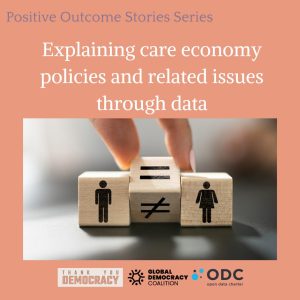Open Data Charter Positive Outcome Story: Explaining care economy policies and related issues through data

In Argentina, there was not much data available on gender pay gap and other gender-related topics. This was true especially for care economy activities which had little to no data and most of the time involve women. There was hence a need to understand if and how this data was created and how it could influence public policy.
Open Data Charter started collaborating with the city of Buenos Aires, especially their data and statistics office, which was already trying to collect data about their policies related to the care economy and its supply/demand dynamics. Understanding how important it is for the “demand side” of data is, civil society and the private sector were invited to participate and collaborate with the government to establish a definition of care economy since there was none as well as which categories of citizens it was targeting the most. This resulted in identifying three main groups, namely children, elderly and the disabled while assessing their needs and understanding how to address them. These same civil society organizations and governmental offices then collaborated to create official indicators and a platform as means to gather and analyze data and statistics around these topics.
As a result, the open platform gives an overview of the trends and latest development of the caretaking economy in Buenos Aires as well while giving the opportunity to the public to easily download all the data and information needed. This was beneficial for all parties involved, especially for the city of Buenos Aires government. This initiative was soon picked up by the government of CDMX which asked Open Data Charter to do the same with them. Therefore, Open Data Charter led the creation of a Care Indicators system for CDMX taking from the learning of the work in Buenos Aires City. Out of these two iterations, the Open Data Charter created the Care Sector Open Up Guide Tool for both countries and cities to be able to replicate the work and create their own indicators to showcase demand and supply dynamics while enhancing advocacy campaigns promoted by civil society organizations. This tool lists a set of core care economy indicators and the high value datasets that governments should be opening up if they want to create a transparent care economy policy.
